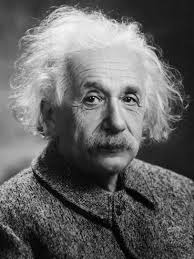Einstein
英 ['aɪnˌstaɪn]
美 ['aɪnˌstaɪn]
- n. 爱因斯坦(著名物理学家)
星级词汇:

记忆方法
为了记忆单词 "Einstein",可以采用以下简单记忆方法:
联想到爱因斯坦的标志性形象——一个秃顶、戴眼镜的科学家。可以将 "Einstein" 的 "Ein" 视为“一个”(One),而 "stein" 可以想象为石头或坚硬的东西,就像是这位科学家的大脑像块“坚硬的石头”一样充满智慧。因此,"Einstein" 可以形象地记住为“一位智慧如坚硬石头的科学家”。
联想到爱因斯坦的标志性形象——一个秃顶、戴眼镜的科学家。可以将 "Einstein" 的 "Ein" 视为“一个”(One),而 "stein" 可以想象为石头或坚硬的东西,就像是这位科学家的大脑像块“坚硬的石头”一样充满智慧。因此,"Einstein" 可以形象地记住为“一位智慧如坚硬石头的科学家”。
以上内容由AI生成, 仅供参考和借鉴
英语词源
- Einstein (n.)
- as a type-name for a person of genius, 1920, in reference to German-born theoretical physicist Albert Einstein (1879-1955), who was world-famous from 1919 through media accounts of his work in theoretical physics. According to "German-American Names" (George F. Jones, 3rd ed., 2006) it means literally "place encompassed by a stone wall."
权威例句
- 1. Einstein had the chutzpah to discard common sense and long-established theory.
- 爱因斯坦敢于抛弃常识和长期公认的理论。
- 2. He is routinely described as the greatest scientist since Einstein.
- 他通常被认为是继爱因斯坦之后最伟大的科学家。
- 3. Einstein's equations showed the Universe to be expanding.
- 爱因斯坦的方程式表明宇宙正在膨胀。
- 4. Einstein formulated the Theory of Relativity in 1905.
- 爱因斯坦于1905年创立了相对论。
- 5. Einstein was one of the greatest thinkers of the 20th century.
- 爱因斯坦是20世纪最伟大的思想家之一。